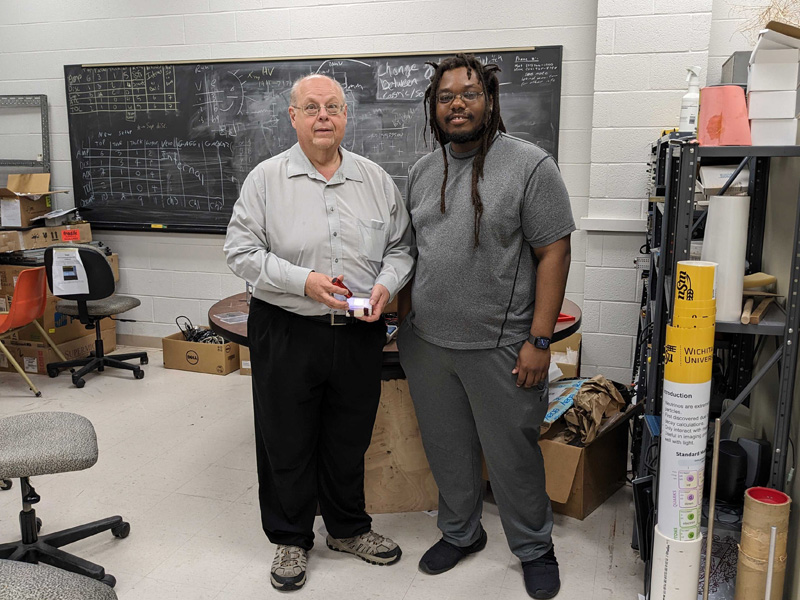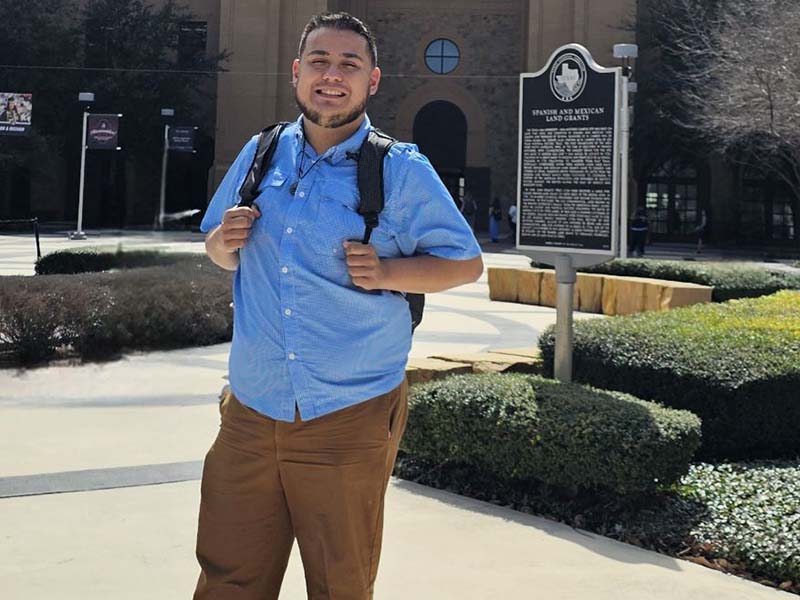┬ķČ╣ŲŲĮŌ░µ State University has offered the traditional educational pathways for over 125 years, typically ending at the point of graduation, but the need for learning continues throughout a personŌĆÖs lifetime.
In a rapidly changing world, continuing education has never been more important. More and more jobs require skill-based certification of learning, which includes the attainment of validated durable and technical skills. To meet those needs, WSU was the first in Kansas to create badge courses for non-degree seeking students in 2015, after approval from the Kansas Board of Regents.
Badges are short courses of one credit hour or less, and instruction is designed using modules of skills-based learning and application. Students in the badge courses must pass with a success rate of 80-85% on all assignments to receive a Badge Granted grade, or BG, which then becomes part of a studentŌĆÖs official WSU transcript.
Designed for adults balancing work and family obligations, badges offering coursework online using open educational resources, meaning no textbooks are required. Coursework completion is flexible, with the requirement that coursework must be completed during the semester it is started. Taught by university faculty, coursework and instruction meets all higher learning education requirements.
A unique aspect of WSU badge courses is that the skills and competency-based curriculum is developed in partnership and with input of employers, government licensing agencies, trade associations and faculty.
ŌĆ£WSU has taken an approach much different than many institutions,ŌĆØ said Kim Moore, executive director of Workforce, Professional and Community Education, who manages badges at WSU. ŌĆ£Instead of partnering one on one with a business, the university is focusing its efforts on professions where we see the greatest need and impact potential. Currently, my work centers around the development of skill-based badges creating career pathways for direct support professionals, who are individuals that provide direct care to individuals with intellectual and behavioral disabilities. Due to a lack of training, low wages and no career pathway, it has been difficult to recruit and retain direct support professionals, and the wait list in Kansas for services is 10 years.ŌĆØ
Badges are value-added education for individuals who already have a degree and can be used for relicensure for many professions. Badges may also be stacked to create skills-based career pathways and certifications for individuals who donŌĆÖt have or need a degree.
In what has largely been the wild west of education and training, there has been no consistency in how and why badges are awarded and no way to track and validate their integrity and value, Moore says. Anyone could award a badge for any reason, and employers could never be sure any documented meaningful learning occurred.
In response, ┬ķČ╣ŲŲĮŌ░µ State has become a leader in the development of national standards related to badges and digital credentials as a founding member of the TrustEd Microcredential Coalition through 1EdTech, a community of leaders from across education sectors and edtech suppliers to build an ecosystem to help learners. The microcredential metadata framework was released from the coalition to set recommended data requirements for microcredentials.
ŌĆ£When someone says they have a badge, what does that even mean?ŌĆØ Moore said. ŌĆ£We really donŌĆÖt know because there hasnŌĆÖt been a way to validate and verify what learning occurred. ThatŌĆÖs why there is the TrustEd Microcredential Coalition, because we are trying to make sure that standards are met, metadata is acquired and that learning can be validated.ŌĆØ
An advantage badges have over traditional coursework and degrees is their flexibility. Badges can quickly adapt, morph or be created to meet the needs of employers and professionals.
One such badge that is currently under development, for launch in 2025, is the Aging Care Professional (ACP) Badge, which aims to complement health care professionalsŌĆÖ education in the field of aging populations.
ŌĆ£ItŌĆÖs us as a community saying, ŌĆśbut they need to know this stuff, too,ŌĆÖŌĆØ said Robert Miller ŌĆö lecturer in the Department Public Health Sciences in the College of Health Professions ŌĆö who is currently helping develop the ACP badge. ŌĆ£It can come alongside health care professionals, and they can say, ŌĆśIŌĆÖm a CNA or newly vetted nurse with my license, but I want more experience in dealing with the aging population.ŌĆÖ They now have something that they can add to their education to get additional skills to be successful.ŌĆØ
When deciding on what badges to offer next, Moore looks to the workforce to see the common concerns employers have and where WSU can help fill in the gaps. Once a workforce need has been identified, a team is put together to develop a badge ŌĆö with insight from faculty, employers and MooreŌĆÖs office ŌĆö that meets those needs.
ŌĆ£ItŌĆÖs all about skills and competencies,ŌĆØ Moore said. ŌĆ£ItŌĆÖs not about grades. ItŌĆÖs about if you can master a skill and become competent and be able to apply that learning in an employment setting, which makes them different than other types of education.ŌĆØ
Matt Fletcher ŌĆö executive director at InterHab, a Kansas-based trade association that represents service providers for those with intellectual and developmental disabilities ŌĆö is one of the workforce partners who helped develop the Direct Support Professional Badges offered at WSU, which aim to provide foundational skills to those working in the intellectual and developmental disabilities field.
ŌĆ£ThereŌĆÖs a number of reasons why badges are very important, and I would argue critical, for our workforce,ŌĆØ Fletcher said. ŌĆ£The intellectual and developmental disabilities system has grown and been developed organically in response to the needs of individuals and communities, but one of the challenges with that is we never took the time to formally create a means by which we develop the workforce. So courses, like those offered from ┬ķČ╣ŲŲĮŌ░µ State University, give us foundational elements that are needed to begin professionalizing our workforce.ŌĆØ
Fletcher also underscored the benefit of having the badges offered online, allowing professionals from across the state to access the professional development opportunities offered even while they work full time.
Moore is not only spearheading WSUŌĆÖs badge program, she is also a nationwide leader on microcredentials, who was recently elected to 1EdTechŌĆÖs board of directors in early 2024 and received a 2022 Leadership Award for higher education leadership from 1EdTech.
ŌĆ£We can have a great impact if, in my opinion, we focus on professions and not individual businesses, so thatŌĆÖs where IŌĆÖve been focusing my efforts,ŌĆØ Moore said. ŌĆ£How can I make a difference within our state and within our community? How can I benefit the people who live here and those that hire them? I am fortunate to be able to focus on such meaningful work that impacts and improves the lives of the stateŌĆÖs most vulnerable populations while providing individuals in low-wage jobs with a career pathway to a better future.ŌĆØ
For a complete catalog of WSU badge courses, visit .
About ┬ķČ╣ŲŲĮŌ░µ State University
┬ķČ╣ŲŲĮŌ░µ State University is Kansas' only urban public research university, enrolling more than 23,000 students between its main campus and WSU Tech, including students from every state in the U.S. and more than 100 countries. ┬ķČ╣ŲŲĮŌ░µ State and WSU Tech are recognized for being student centered and innovation driven.
Located in the largest city in the state with one of the highest concentrations in the United States of jobs involving science, technology, engineering and math (STEM), ┬ķČ╣ŲŲĮŌ░µ State University provides uniquely distinctive and innovative pathways of applied learning, applied research and career opportunities for all of our students.
The Innovation Campus, which is a physical extension of the ┬ķČ╣ŲŲĮŌ░µ State University main campus, is one of the nationŌĆÖs largest and fastest-growing research/innovation parks, encompassing over 120 acres and is home to a number of global companies and organizations.
Follow ┬ķČ╣ŲŲĮŌ░µ State on social media:






